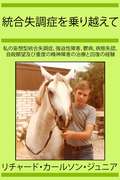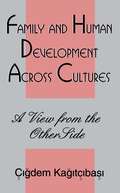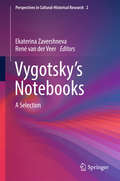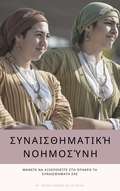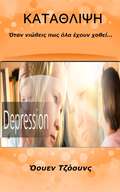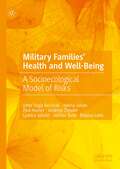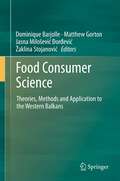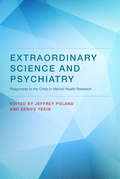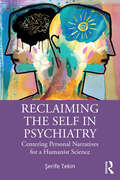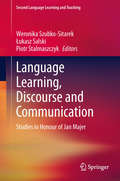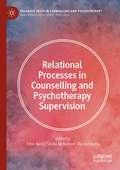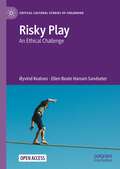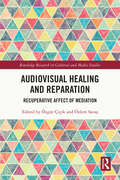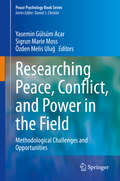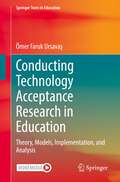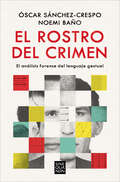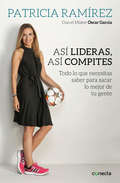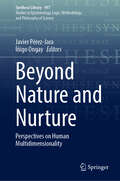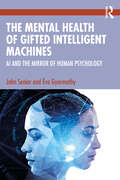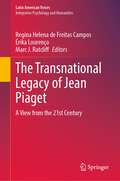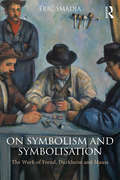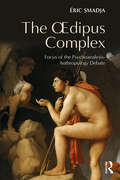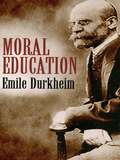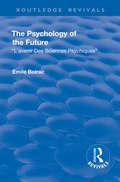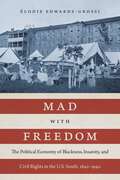- Table View
- List View
統合失調症を乗り越えて: 私の妄想型統合失調症、強迫性障害、鬱病、病態失認、自殺願望及び重度の精神障害の治療と回復の経験
by リチャード・カールソン・ジュニアリチャード・カールソン・ジュニアは21歳の時に妄想型統合失調症と診断される。発症したのは幼少期。10年以上もの間、近代精神医学はリチャードに適切なケアを与えることはなかった。警察沙汰をキッカケにリチャードは初めて自分の診断を受け入れるようになり、回復への長い道のりを歩きだす。以降、10年以上治療を続けた結果人生が大幅に改善され、統合失調症に加え、倦怠感、鬱病、強迫性障害からも回復することとなる。
Family and Human Development Across Cultures: A View From the Other Side
by €igdem KagitibasiThe culmination of 15 years of research by a Turkish psychologist who was educated in the West, this volume examines both the theoretical and practical aspects of cross-cultural psychology. It takes a contextual-developmental-functional approach linking the child, family, and society as they are embedded in culture. A refreshingly different view, the author presents a portrait of human development from "the other side"--from the perspective of the "majority world." In a world seemingly dominated by American psychology, she proposes the cross-cultural orientation as a corrective to the culture-boundedness of much of Euro-American psychology. Analyzing human development in context while avoiding the pitfalls of extreme relativism, this work studies development with an inclusive, holistic, and ecological perspective, focusing on the development of the self and of competence. In so doing, it also attempts to combine cultural contextualism with universalistic standards and psychological processes. It proposes a theory of family change which challenges some commonly held modernization assumptions, and links theory and application while examining the role of psychology in inducing social change.
Vygotsky’s Notebooks
by René van der Veer Еkaterina ZavershnevaThis book consists of previously unpublished manuscripts by Vygotsky found in the first systematic study of Vygotsky’s family archive. The notebooks and scientific diaries gathered in this volume represent all periods of Vygotsky’s scientific life, beginning with the earliest manuscript, entitled The tragicomedy of strivings (1912), and ending with his last note, entitled Pro domo sua (1934), written shortly before his death. The notes reveal unknown aspects of the eminent psychologist’s personality, show his aspirations and interests, and allow us to gain insights into the development of his thinking and its internal dynamics. Several texts reflect the plans that Vygotsky was unable to realize during his lifetime, such as the creation of a theory of emotions and a theory of consciousness, others reveal Vygotsky’s involvement in activities that were previously unknown, and still others provide outlines of papers and lectures. The notes are presented in chronological order, preceded by brief introductions and accompanied by an extensive set of notes. The result is a book that allows us to obtain a much deeper understanding of Vygotsky’s innovative ideas.
Συναισθηματική Νοημοσύνη: Μάθετε να Αξιοποιείτε στο Έπακρο τα Συναισθήματα σας (Beihefte Zur Zeitschrift Für Romanische Philologie Ser. #115)
by ΔΡ. ΧΟΥΑΝ ΜΩΥΣΗΣ ΔΕ ΛΑ ΣΕΡΝΑΤα θέματα που απασχολούν και επικρατούν στις συζητήσεις στον τομέα της Ψυχολογίας τα τελευταία χρόνια αφορούν τη Συναισθηματική Nοημοσύνη, ως μια περαιτέρω εξέλιξη του πεδίου μελέτης των ανθρώπινων συναισθημάτων και των επιπτώσεών τους στη ζωή, γιατί τότε αποκτούν πρωταγωνιστικό ρόλο σε τομείς τόσο σημαντικούς όσο η εκπαίδευση ή η επιχειρηματικότητα, χάρη στα οφέλη που έχει παρατηρηθεί ότι αποφέρει τόσο η αξιοποίηση όσο και η ικανοποίηση με τη ζωή εκείνων που καλλιεργούν τη Σ.Ν.. Αυτό το ebook προσφέρει μια προσέγγιση στις πιο πρόσφατες έρευνες που πραγματοποιούνται στο πεδίο της Σ.Ν., και πώς αυτή μπορεί να εφαρμοστεί στην καθημερινή ζωή για να αποκτηθούν τα μεγαλύτερα πιθανά οφέλη. Αναγκαίο μονοπάτι, αυτό δηλαδή της ανάπτυξης της Σ.Ν., μόλις τελειώσετε την ανάγνωση αυτού το&
Κατάθλιψη: Όταν νιώθεις πως όλα έχουν χαθεί… (Πώς να… #77)
by Όουεν ΤζόουνςΓεια σου. Σ’ ευχαριστώ που αγόρασες το ηλεκτρονικό βιβλίο Κατάθλιψη (Τίτλος πρωτοτύπου: Depression). Ελπίζω να βρεις τις πληροφορίες αυτές χρήσιμες και ωφέλιμες. Θα ήθελα να γνωρίζεις ότι έγραψα το περιεχόμενο αυτού του βιβλίου κατόπιν σημαντικής έρευνας. Το βιβλίο μπορείς να το αγοράσεις μόνο από εμένα. Οι πληροφορίες σε αυτό το βιβλίο πάνω στις διάφορες πτυχές της κατάθλιψης και σχετικών αντικειμένων είναι διαχωρισμένες σε 15 κεφάλαια των περίπου 500-600 λέξεων το καθένα. Αν έχεις τυχόν σχόλια ή προτάσεις βελτίωσης, δώσ’ τα στην εταιρεία από την οποία αγόρασες αυτό το βιβλίο. Από εκεί, μπορείς, επίσης, να βρεις κι άλλα βιβλία σαν αυτό. Σ’ ευχαριστώ και πάλι για την αγορά αυτού του βιβλίου. Με εκτίμηση, Όουεν Τζόουνς
Military Families' Health and Well-Being: A Socioecological Model of Risks
by Janja Vuga Beršnak Jelena Juvan Živa Humer Andreja Živoder Ljubica Jelušič Alenka Švab Bojana LobeThis book examines military families' well-being and health outcomes by providing a critical theoretical perspective on their position and the risks and challenges affecting them. Authors explore the tension between demands made by two greedy institutions—the military and the family—and how the well-being of families is negotiated between the two. Uniquely, the book employs an integrative approach to observing and analyzing military-specific risk and protective factors for health outcomes of military families on various social-ecological levels, including relationship satisfaction and dissatisfaction, intimate partnership violence, parent-child relationships, child well-being, psychoactive substance abuse, depression, and PTSD. Throughout the chapters, the authors analyze research findings that reveal new health outcomes and present an empirically-tested model of military-specific risk and protective factors.
Food Consumer Science
by Dominique Barjolle Jasna Milošević Đorđević Žaklina Stojanović Matthew GortonThis book explores the main methods, models, and approaches of food consumer science applied to six countries of the Western Balkans, illustrating each of these methods with concrete case studies. Research conducted between 2008 and 2011 in the course of the FOCUS-BALKANS project forms an excellent database for exploring recent changes and trends in food consumption.
Extraordinary Science and Psychiatry: Responses to the Crisis in Mental Health Research (Philosophical Psychopathology)
by Jeffrey Poland Şerife TekinLeading scholars offer perspectives from the philosophy of science on the crisis in psychiatric research that exploded after the publication of DSM-5.Psychiatry and mental health research is in crisis, with tensions between psychiatry's clinical and research aims and controversies over diagnosis, treatment, and scientific constructs for studying mental disorders. At the center of these controversies is the Diagnostic and Statistical Manual of Mental Disorders (DSM), which—especially after the publication of DSM-5—many have found seriously flawed as a guide for research. This book addresses the crisis and the associated “extraordinary science” (Thomas Kuhn's term for scientific research during a state of crisis) from the perspective of philosophy of science. The goal is to help reconcile the competing claims of science and phenomenology within psychiatry and to offer new insights for the philosophy of science. The contributors discuss the epistemological origins of the current crisis, the nature of evidence in psychiatric research, and the National Institute for Mental Health's Research Domain Criteria project. They consider particular research practices in psychiatry—computational, personalized, mechanistic, and user-led—and the specific categories of schizophrenia, depressive disorder, and bipolar disorder. Finally, they examine the DSM's dubious practice of pathologizing normality.ContributorsRichard P. Bentall, John Bickle, Robyn Bluhm, Rachel Cooper, Kelso Cratsley, Owen Flanagan, Michael Frank, George Graham, Ginger A. Hoffman, Harold Kincaid, Aaron Kostko, Edouard Machery, Jeffrey Poland, Claire Pouncey, Şerife Tekin, Peter Zachar
Reclaiming the Self in Psychiatry: Centering Personal Narratives for a Humanist Science
by Şerife TekinReclaiming the Self in Psychiatry: Centering Personal Narratives for Humanist Science diagnoses the fundamental problem in contemporary scientific psychiatry to be a lack of a sophisticated and nuanced engagement with the self and proposes a solution—the Multitudinous Self Model (MuSe).MuSe fulfils psychiatry’s twin commitments to patients’ flourishing and scientific objectivity. Marshalling the conceptual and empirical resources from testimonies from individuals diagnosed with mental disorders, substantive research in cognitive science, and empirically informed philosophy, MuSe provides clinicians, scientists, and patients pathways to respond to mental distresses and disorders. This framework boosts psychiatry’s relationship to science by facilitating expansive notions of expertise and objectivity in which some patients are recognized as “experience-based experts” whose contributions to psychiatric knowledge are indispensable. Şerife Tekin draws the contours of a future for psychiatry that is grounded in philosophy, medical humanities, and social sciences as much as physiology and neuroscience.This book is an ideal read for professional psychiatrists and philosophers of psychiatry who are interested in the philosophy of mental health.
Language Learning, Discourse and Communication
by Weronika Szubko-Sitarek Łukasz Salski Piotr StalmaszczykThis volume brings together papers on a wide spectrum of topics within the broad area of language acquisition, stressing the interconnections between applied and theoretical linguistics, as well as language research methodology. These contributions in honor of Professor Jan Majer have been grouped in two sections: language learning, and discourse and communication. The former discusses issues varying from aspects of first, second, and third language acquisition, individual learner differences (i. e. gender, attitudes, learning strategies), and second language research methodology to the analysis of features of learner spoken language, the role of feedback in foreign language instruction, and the position of culture in EFL textbooks. The second part of the volume offers a theoretical counterbalance to the applied nature of the first one. Here, the contributions touch upon spoken and written language analysis, language awareness, and aspects of the English language; also, selected issues of language philosophy are discussed. The wide range of topics covered in the publication, authored by specialists in their respective areas, reflects Professor Majer's academic interests and corresponds to the complex nature of the general field the volume aims to portray.
Relational Processes in Counselling and Psychotherapy Supervision (Palgrave Texts in Counselling and Psychotherapy)
by Ottar Ness Sheila McNamee Øyvind KvelloThis book is focused on relational processes in supervision for counselling and psychotherapy. The aim is first to introduce a relational theoretical stance, then to apply that stance to the process of supervision, and finally to offer practitioners immediately accessible resources for relational supervision. Within a relational perspective, supervisor and supervisees are viewed as partners who co-construct the supervisory process. Unlike other approaches to supervision where the emphasis is on specific techniques and strategies for supervision, the relational orientation of this book invites supervisor and supervisee into different understandings of the supervisory interaction. This orientation directs our attention to the importance of co-creating the therapeutic relation/alliance with special attention to the wellbeing of the the supervisee and the supervisor. Supervision, from this perspective, is focused on what participants are making together rather than on the individual abilities, strengths, and weaknesses of either the supervisor or the supervisee.
Risky Play: An Ethical Challenge (Critical Cultural Studies of Childhood)
by Øyvind Kvalnes Ellen Beate Hansen SandseterThis open access book brings together current childhood research and contemporary ethical theory to draw attention to how children depend upon a scope of action for risky play for their mental and physical development. In many countries, the opportunities for children to play away from adults' close attention have decreased. At both school and home, protection and avoidance of harm take increasing priority. This book draws a distinction between do-good ethics and avoid-harm ethics to highlight ethical tensions and dilemmas encountered by professionals who work with children, and suggests better ways to balance these ethical dimensions in approaching risky play.
Audiovisual Healing and Reparation: Recuperative Affect of Mediation (Routledge Research in Cultural and Media Studies)
by Özgür Çiçek Özlem SavaşAudiovisual Healing and Reparation gathers a collection of scholarly and creative voices that explore how audiovisual media can serve as a catalyst for healing, reparation, resilience, care and hope.The contributors critically engage with the audiovisual mediations of harsh histories and experiences of violence, discrimination, racism, sexism, colonialism, displacement, illness and death, all situated within diverse historical, geographical, social, and political contexts. Through a reparative approach to films, documentaries, digital and social media, and art, they examine how audiovisuality intervenes in and transforms trauma, rupture, loss and silence. This book examines audiovisual media as a rich aesthetic, social and political site for acknowledging wounds, seeking healing, and reparatively reimagining a broken world during troubling times. It argues for the recuperative affect of audiovisuality, which can unlock silenced or suppressed (personal) histories by integrating them into the fabric of mundane daily life. It analyses two major questions: What kind of recuperative potentials can emerge from audiovisual mediations of troubling times? How can we (re)imagine audiovisual mediums, narratives, aesthetics, and practices as reparative possibilities?This book will be of interest to scholars working in film and media studies, cultural studies, memory studies, performance studies, and affect studies and will also inspire practitioners of audiovisual media.
Researching Peace, Conflict, and Power in the Field: Methodological Challenges and Opportunities (Peace Psychology Book Series)
by Yasemin Gülsüm Acar Sigrun Marie Moss Özden Melis UluğThis edited volume offers useful resources for researchers conducting fieldwork in various global conflict contexts, bringing together a range of international voices to relay important methodological challenges and opportunities from their experiences. The book provides an extensive account of how people do conflict research in difficult contexts, critically evaluating what it means to do research in the field and what the role of the researcher is in that context. Among the topics discussed:Conceptualizing the interpreter in field interviews in post-conflict settingsData collection with indigenous peopleChallenges to implementation of social psychological interventionsResearching children and young people’s identity and social attitudesInsider and outsider dynamics when doing research in difficult contextsWorking with practitioners and local organizations Researching Peace, Conflict, and Power in the Field is a valuable guide for students and scholars interested in conflict research, social psychologists, and peace psychologists engaged in conflict-related fieldwork.
Conducting Technology Acceptance Research in Education: Theory, Models, Implementation, and Analysis (Springer Texts in Education)
by Ömer Faruk UrsavaşThis book provides an in-depth discussion of the emergence of technology acceptance theories and models, how we can use these theories and models in education, and data collection and analysis processes of technology acceptance research in education. The book discusses how we can make meaning of technology and apply it to educational settings while we investigate the processes via which people adopt technology in education. The book will appeal to students enrolled in upper undergraduate and graduate courses that cover technology acceptance and use in education, researchers who would like to conduct technology acceptance research in education and need a comprehensive resource, and practitioners such as teachers and administrators who would like to promote technology use at schools.
El rostro del crimen: El análisis forense del lenguaje gestual
by Óscar Sánchez-Crespo Noemí BañoEl ensayo que nos presenta un método único para descifrar los pequeños gestos que delatan a un criminal. CON LA COLABORACIÓN DE LA POLICÍA NACIONAL Un proyecto del grupo de empresas Comunicación gestual. El sistema de comunicación más usado en el ámbito jurídico es la palabra escrita: transcripciones de acusados, víctimas, testigos, dictámenes periciales, sentencias, etc. Sin embargo, el momento en el que un ser humano aporta más información al mensaje que transmite se produce cuando se ve inmerso en algún tipo de emoción, miedo, sorpresa, ira, repulsión, tristeza, felicidad, desprecio... Cuando escuchamos y observamos a alguien, la percepción de estas reacciones emocionales, unido al mensaje que se transmite de forma verbal, es lo que nos hace darle más o menos credibilidad a la persona que nos habla. Desde hace más de diez años, Óscar Sánchez-Crespo y Noemi Baño se dedican al análisis forense del lenguaje gestual. Ha colaborado con diversos cuerpos policiales del Estado y su trabajo ha sido decisivo en centenares de juicios. En este, su primer libro, nos acerca las claves de su método a través de testimonios, anécdotas y casos reales.
Así lideras, así compites: Todo lo que necesitas saber para sacar lo mejor de tu gente
by Óscar García Junyent Patricia Ramírez LoefflerCómo liderar equipos, sean de fútbol, de trabajo o tu propia familia. «El talento gana juegos, pero el trabajo en equipo y la inteligencia ganan campeonatos» Michael Jordan Si como afirma Jorge Valdano el fútbol es un laboratorio de la vida, la figura del entrenador resulta ideal como punto de partida para comprender las verdaderas claves de la dirección de equipos y de la gestión de personas. Partiendo de esta premisa, Patricia Ramírez explica en Así lideras, así compites las herramientas que permitirán al lector mejorar sus capacidades cuando se ponga al frente de un grupo de personas, sean estas un departamento de una empresa, un equipo deportivo, los estudiantes de una clase o su propia familia. A partir de su propia experiencia con equipos de fútbol de primer nivel y con deportistas de élite, Patricia ha sido capaz de condensar las características que hacen de una persona un buen entrenador: desde la habilidad para marcar objetivos claros, hasta la capacidad para soportar la presión, pasando por la predisposición para delegar bien. En definitiva, la importancia de contar con un equipo motivado para alcanzar el éxito y las claves para conseguirlo. Porque en última instancia, más que los resultados, lo que cuenta para el éxito a largo plazo es el rendimiento. Reseñas: «Así lideras, así compites es una gran guía sobre el liderazgo aplicado al deporte, especialmente al fútbol. Además de dar a conocer distintas herramientas y fórmulas para liderar tanto en el ámbito deportivo como para aplicarlo a la propia vida, cada capítulo se cierra con la visión de Óscar García y sus experiencias en el banquillo. Me parece una propuesta diferente y fresca.» Vicente del Bosque, seleccionador nacional «El libro Así lideras, así compites transmite valores de esfuerzo, liderazgo y equipo que comparten el mundo del fútbol y de la empresa, valores imprescindibles para buscar el éxito personal y profesional, y así poder disfrutar de la satisfacción del trabajo bien hecho.» Javier Jiménez, empresario y vicepresidente del Granada CF «Claridad, perspectiva, inteligencia, equilibrio, audacia, lealtad, confianza, credibilidad, buen humor, compromiso... El poder de las expectativas y del ejemplo, la fuerza del grupo... Así lideras, así compites describe de forma práctica y sencilla, ejercicios incluidos, las características de un buen entrenador, un líder, y el camino para acercarse lo más posible a la meta. Una lección de vida.» Óscar Campillo, director del diario Marca «En el deporte profesional es necesario querer poder, pero sobre todo creer. Visualizar el éxito antes de conseguirlo y concienciarse de cada paso que hay que dar en su búsqueda. Y por eso la figura del psicólogo deportivo es tan imprescindible como la del entrenador o el preparador físico. Patricia Ramírez y este libro son buena prueba de ello, y deportistas como Rafa Nadal demuestran a diario que la mente puede vencer a la materia.» Manolo Lama, periodista de la cadena Cope y Deportes Cuatro
Beyond Nature and Nurture: Perspectives on Human Multidimensionality (Synthese Library #497)
by Javier Pérez-Jara Íñigo OngayThis book gathers several of the world&’s leading scholars in the nature vs. nurture debate, offering a timely reconsideration of the dynamic interactions between physical, chemical, biological, social, and cultural factors that shape human multidimensionality. Emphasizing this multidimensionality, this edited volume seeks to bridge the divide between biology and social theory—two research communities that have too often overlooked each other. These disciplines, despite being central to understanding human nature, have long operated in isolation. While some animal species exhibit higher degrees of phenotypic plasticity in specific traits, humans stand out as the most plastic species in both their neurological and sociocultural systems. This plasticity leads the contributors of this book to move beyond both biological reductionism and the blank-slate hypothesis. While biology undoubtedly plays a role in shaping and stabilizing human social and cultural processes, it does so only within the framework of an inherently social environment—one shaped by historically contingent and socially constructed realities, such as values, codes, and cultural perceptions. More importantly, cultural structures and social interactions actively shape and transform certain biological features that were once considered immutable. This book lays the groundwork for a productive dialogue among biologists, psychologists, social theorists, and philosophers. It also highlights some of the moral and political consequences of different perspectives within the nature vs. nurture debate. Through updated scientific and philosophical theorizing, the chapters in this book aim to overcome, once and for all, the simplistic yet persistent opposition between nature and nurture, offering a far more complex and dynamic—yet richer and epistemologically manageable—picture of the human being.
The Mental Health of Gifted Intelligent Machines: AI and the Mirror of Human Psychology
by John Senior Éva GyarmathyThe Mental Health of Gifted Intelligent Machines explores the increasingly sophisticated behaviours of developing AI and how we can ensure it will have emotional resilience, ethical strength and an ability to think in a new and enhanced way. Its primary aim is to change how we understand the world by investigating humanity as an intelligent being, examining and contrasting human and artificial intelligence. The book considers what we can learn from the likely mental health issues that will occur with increasingly sophisticated aspects of machine intelligence and how they will reflect the human condition. It asks questions about our identity in a deeply uncertain and disruptive ever-changing world; how we will improve and enhance our psychological intelligence to meet the increasing complications and demands of the future; and what we need to do, now, to be psychologically intelligent enough to live a full meaningful life in a new world evolving around us. The book argues that changes in our understanding of mental health, psychology and our view of intelligence will challenge huge aspects of our fundamental beliefs and assumptions and that it is essential we explore new arenas to further understand both our own human psychological issues and mental health as we develop gifted intelligent machines. It is a must read for all students, researchers and professionals involved with AI, gifted education, consciousness and mental health.
The Transnational Legacy of Jean Piaget: A View from the 21st Century (Latin American Voices)
by Marc J. Ratcliff Regina Helena de Freitas Campos Érika LourençoThis book presents a collection of studies on the circulation of Jean Piaget’s ideas and works between Europe and Latin America, and how this transnational legacy influenced different fields of research and practice, such as psychology, education and philosophy. The volume brings together contributions presented at the International Colloquium Jean Piaget in Brazil and Latin America, held during the 38th Annual Helena Antipoff Meeting, organized by the Federal University of Minas Gerais, Brazil, in collaboration with the University of Geneva, Switzerland. The book is organized in three parts. Chapters in the first part analyze Piaget’s role as a builder of an international network in psychology, education and peace promotion in the 20th century, with a special focus on the circulation of his ideas and works between Switzerland and France. The second part focuses on historical and contemporary dialogues, conflicts and controversies between Piaget and other authors, such as Henri Wallon, Carl Rogers, Jürgen Habermas, and, especially, Helena Antipoff, the Russian-Brazilian psychologist and educator who was one of the first researchers to introduce Piaget in Brazil and to establish a bridge between Latin America and the Geneva school of psychological and educational sciences. Finally, chapters in the third part of the book explore different aspects of the reception and appropriation of Piaget’s works and ideas in the Brazilian context. The Transnational Legacy of Jean Piaget: A View from the 21st Century will be of interest to researchers in different fields within the human and social sciences, such as developmental, educational and school psychologists; educators; philosophers and historians of psychology and education interested in understanding how Piaget’s progressist ideas have contributed to the development of psychological and educational sciences in Europe and Latin America. Some chapters of this book were originally written in Portuguese and French and translated into English with the help of artificial intelligence. A subsequent human revision was done primarily in terms of content.
On Symbolism and Symbolisation: The Work of Freud, Durkheim and Mauss
by Éric SmadjaIn On Symbolism and Symbolisation: The Work of Freud, Durkheim and Mauss, Éric Smadja returns to the end of the 19th century and explores how the concepts of symbolism and symbolisation have been discussed among theorists, and how this discussion has developed and revolutionised the human sciences as we know them today. Uniquely, he connects three key thinkers of psychoanalysis, sociology and ethnology – Freud, Durkheim and Mauss – and discusses how their diverse epistemological paths blend and have consequently shaped our representation of humanity, society and culture in the 20th and 21st centuries. In this innovative work, Smadja provides a complete biographical journey of these three influential founders, beginning with a dedicated chapter on Freud, followed by Durkheim and then Mauss. He explains each of their revolutionary creations – Freud’s psychoanalysis, Durkheim’s French school of sociology and Mauss’s modern French ethnology – before exploring their ground-breaking, yet differing, conceptions of symbolism and symbolisation, offering a discussion of specific and common aspects detected between these conceptions. In his conclusions, Smadja focusses on France to examine what became of their thoughts after the second half of the 20th century. He inspects the fields of French anthropology, sociology and psychoanalysis: Lévi-Strauss and his structuralist revolution, his colleagues Françoise Héritier and Maurice Godelier, Pierre Bourdieu, who was an ethnologist before becoming a sociologist, and, of course, Lacan. On Symbolism and Symbolisation: The Work of Freud, Durkheim and Mauss is a pioneering work that will appeal to psychoanalysts in practice and in training, and to academics and students of psychology, anthropology, sociology, philosophy and the history of ideas. It will also be of interest to anyone wanting to learn more about the life and work of these three major theorists and the connections between the human and social sciences.
The Oedipus Complex: Focus of the Psychoanalysis-Anthropology Debate
by Éric SmadjaThis book examines the contentious relationship between psychoanalysis and anthropology as it has played out in disputes surrounding the Oedipus complex. Here, Éric Smadja explores the complicated historical and epistemological conditions leading up to the emergence of the conflict between the two disciplines. He considers the origins of each science, the "creation" of the Oedipus complex, and the place, role and influence of Freud’s key and controversial work Totem and Taboo, both in the history of psychoanalysis and as it connects with anthropology internationally. Focusing on such key figures as Bronislaw Malinowski, Ernest Jones, Franz Boas, Georges Devereux, Emile Durkheim, Claude Levi-Strauss and Jacques Lacan, Smadja charts the course of the debate as it unfolded during the twentieth century and tracks its contemporary status of the debate, with a focus on figures in both France and the United States. Discussing the divergences and convergences between the two fields, he compares and contrasts their historical, epistemological and methodological features and reflects on the new "acculturative" disciplines emerging from their interaction. The book concludes with a look at what the conflictual history of these two human sciences can tell us about the history of ideas and their processes and modes of communication. Exploring a dispute which reaches back to the very beginnings of psychoanalysis and anthropology, The Oedipus Complex will appeal to psychoanalysts in practice and in training, psychotherapists and academics and students of psychoanalytic studies, anthropology and the history of ideas.
Moral Education
by Émile DurkheimThe great French sociologist and philosopher Emile Durkheim is best known for his classic book Suicide (1897), a landmark in social psychology. Among his other major works is this study in the sociology of education, which features 18 lectures by an influential theorist who discusses his ideas on the school as the appropriate setting for moral education. The first element in developing a moral being, he maintains, is instilling a sense of discipline, followed by a willingness to behave in terms of the group's collective interest, and a sense of autonomy. Durkheim also examines discipline and the psychology of the child, discipline of the school and the use of punishment, altruism in the child, the influence of the school environment, and the teaching of science, aesthetics, and history. Perceptive and provocative, this volume abounds in valuable insights for teachers and others involved in education.
Revival: L'Avenir des Sciences Psychiques (Routledge Revivals)
by Émile BoiracMaterial contained in this book constitute an entirely new departure in the field of psychological study and experimentation.
Mad with Freedom: The Political Economy of Blackness, Insanity, and Civil Rights in the U.S. South, 1840–1940
by Élodie Edwards-GrossiThe use of race in studies of insanity in the 1840s and 1850s gave rise to politically charged theories on the differential biology and pathologies of brains in whites and Blacks. In Mad with Freedom, Élodie Edwards-Grossi explores the largely unknown social history of these racialized theories on insanity in the segregated South. She unites an institutional history of psychiatric spaces in the South that housed Black patients with an intellectual history of early psychiatric theories that defined the Black body as a locus for specific pathologies. Edwards-Grossi also reveals the subtle, localized techniques of resistance later employed by Black patients to confront medical power. Her work shows the continuous politicization of science and theories on insanity in the context of Reconstruction and the Jim Crow South.
